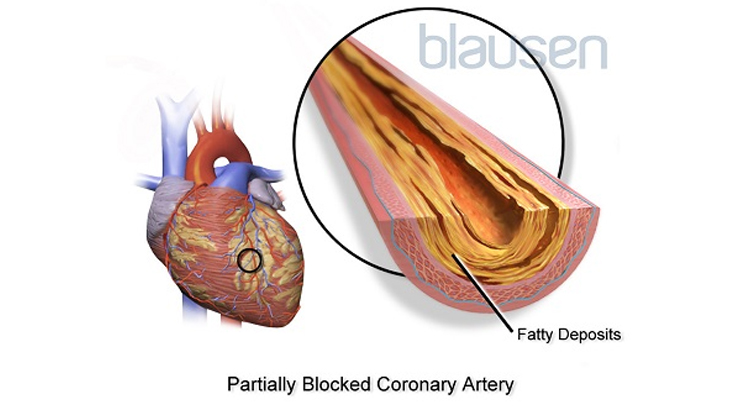Advanced treatment for this common heart disease
Coronary artery disease is the most common type of heart disease in the United States, and the specialists in our Cardiac Surgery and Interventional Cardiology programs develop and use the latest surgical and technological advances to treat it.
The disease is often caused by atherosclerosis, a condition in which the arteries become narrow because of the buildup of plaque. A complete blockage can result in a heart attack or stroke.
Artherosclerosis and Plaque Rupture
The blockage caused by a thrombus can be life threatening. A blockage in the coronary arteries may cause a heart attack,
Symptoms

-
Pain in your neck or left arm
-
Shortness of breath
-
Chronic Total Occlusion (CTO) the complete blockage of one or more coronary arteries for 90 days or longer. CTO is caused by the formation plaque which narrows and restricts blood flow to the heart before completely blocking the arteries.
Prevention
Your risk for this disease increases as you age, and men are generally at greater risk than women.
However, there are some lifestyle changes you can make to prevent and control the condition, including:
-
Achieve and maintain a healthy weight
-
Choose healthy foods
-
Exercise
-
Find healthy stress management techniques
-
Manage your diabetes, high blood pressure, and high cholesterol
-
Quit smoking
Tests
Chest X-ray
Chest X-rays use a small dose of radiation to create pictures of the structures inside the chest, including the lungs, heart, and chest wall.
Computerized Tomography (CT) Scan
The cardiac computed tomography scan, or cardiac CT, uses X-rays to create three-dimensional images of your heart and blood vessels.
Echocardiogram
An echocardiogram uses high-frequency sound waves to create images of your heart.
Electrocardiogram (ECG)
An electrocardiogram, also known as an ECG, measures the heart’s electrical activity.
Fractional Flow Reserve
Fractional flow reserve, also known as FFR, is a measurement of how well blood can flow through the coronary arteries. Narrowing or blockages in these arteries can lead to a heart attack without treatment.
Magnetic Resonance Imaging (MRI)
Magnetic resonance imaging, better known as cardiac MRI, is a combination of radio waves, magnets, and computer technology to create images of your heart and blood vessels.
Stress Tests
Stress tests are used to assess how your heart works during physical activity. There are several types of stress tests, including treadmill or bike stress tests, nuclear stress tests, stress echocardiograms, and chemically induced stress tests.
Treatments
Treatments for this disease can increase blood flow to your heart and slow the progression of the disease, but are not a cure. Treating the disease involves reducing your risk factors, which may involve lifestyle changes. Your disease also may be treated with medication or surgical procedures.
Angioplasty
Angioplasty improves blood flow through the arteries by clearing plaque buildup.
Coronary Artery Bypass Surgery
This surgery, also known as coronary artery bypass graft surgery (CABG), restores normal blood flow through narrowed or blocked arteries by using a healthy blood vessel taken from your leg, arm, or chest to create a detour around the problem area.
Coronary Artery Stenting
These stents are small mesh tubes placed within the artery to prevent blockages and allow better blood flow.
Intracoronary Radiation Therapy
Intracoronary radiation therapy is an innovative treatment that uses radiation to prevent scar tissue buildup in the arteries after an angioplasty or stent placement.
Off-Pump Bypass Surgery (Beating-Heart Bypass)
Off-pump bypass surgery, also known as beating-heart bypass surgery, is an option for many patients to have coronary artery bypass surgery without needing to stop the heart or lungs during the procedure.
Heart Surgery
Heart surgery is an option to treat many heart conditions. You may need heart surgery either as a lifesaving procedure or when other treatments haven’t worked.
What is your heart age?
Each year about 655,000 Americans die from heart disease – that’s one in every four deaths. Understanding your Heart Age is a way to assess your risk factors for heart attack and stroke. Some things put you at risk for a heart attack or stroke that you cannot change, such as getting older or your family history, but there are ways to lower your risk.
Our providers
Location: Change location Enter your location
-
Peter John Bergquist, MD
Diagnostic Radiology
-
Daniel James Dooley, MD
Cardiology
-
Lindsey M Duchesne, PA-C
Cardiovascular Disease
-
Patrick Fong, MD
Internal Medicine
-
Douglas Bernard Jacobs, MD MDMPH
Internal Medicine
 Not Accepting
Not Accepting
New Patients Not Accepting New Patients -
Nancy Kim, MD
Diagnostic Radiology
-
Arie Neymotin, DO
Diagnostic Radiology
-
Sriram Padmanabhan, MBBS MD MPH MS
Cardiology
-
Ana Paunovic, MD
Internal Medicine
-
Dhiren Shah, MD
Internal Medicine
-
Daniel Lowell Sherwood, MD
Diagnostic Radiology
-
Cari R. Tobin, PA
Internal Medicine
 Not Accepting
Not Accepting
New Patients Not Accepting New Patients -
Fatraa Usman, MSN NP
Critical Care Medicine
-
Juan Verastegui Jimenez, MD
Internal Medicine
-
Joelle Wazen, MD
Diagnostic Radiology
-
Theodore Alexander Stephens, MD
Internal Medicine
 Not Accepting
Not Accepting
New Patients Not Accepting New Patients
Insurance
MedStar Health accepts most major health insurance plans. If you are uncertain as to whether your individual health insurance plan is accepted at MedStar Health, please call your insurance company.









